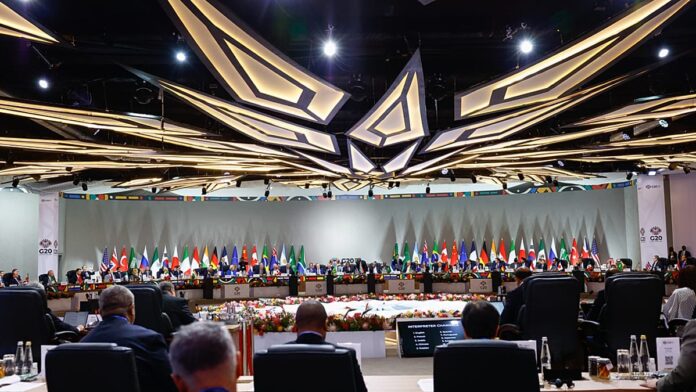G20 leaders adopted a statement addressing the climate crisis and other global issues at the start of the G20 conference in South Africa on Saturday, a declaration that comes amid US boycott and opposition and as EU leaders responded to a US-proposed peace plan for Ukraine.
A statement from a sideline meeting of EU leaders “reiterated that the implementation of elements relating to the European Union and relating to NATO would need the consent of EU and NATO members respectively”.
Their statement came as Washington’s proposed peace plan for Ukraine loomed large on the G20 opening and sidelines on Saturday.
The two-day summit, the first to be held in Africa, opened on Saturday with leaders and top government officials from leading and emerging economies coming together in Johannesburg without US participation following a boycott by US President Donald Trump.
A spokesperson for South African President Cyril Ramaphosa told reporters that the summit’s adopted declaration on the climate crisis “can’t be renegotiated,” citing language that Washington has objected to.
“We had the entire year of working towards this adoption, and the past week has been quite intense,” the spokesperson said.
In his speech at the opening, Ramaphosa stressed the importance of the meeting for the entire continent. “As this is the first G-20 leader summit to be held in Africa, it carries the hopes and must reflect the aspirations of the people of this continent and of the world,” said Ramaphosa.
The South African President stated that it is the responsibility of all participants “not to allow anything to diminish the value, the stature, and the impact of the first African G20 presidency.”
Among the leaders were the European Union’s top officials, EU Commission President Ursula von der Leyen and Council President Antonio Costa.
In her speech, von der Leyen at the G20 Session stressed the importance of the summit, calling for “inclusive and sustainable economic growth that leaves no one behind.”
“Addressing global imbalances requires coordinated and cooperative action: With the help of our international institutions, the IMF, the WTO, and the World Bank, we should have a genuine assessment of global imbalances where root causes are discussed,” said Von der Leyen.
“Europe needs to shoulder its responsibilities and boost investment, but I repeat, this is a collective responsibility,” she added.
EU wants ‘additional work’ on Trump Ukraine peace plan
Despite the US boycott and the presence of several European leaders, Washington’s proposed peace plan for Ukraine loomed large on the summit’s sidelines.
British Prime Minister Keir Starmer, French President Emmanuel Macron, and German Chancellor Friedrich Merz met to try to hash out alternatives to a US plan to halt Moscow’s war against Ukraine, nearly four years after it invaded its neighbour.
After a sideline meeting, the EU, in a statement, welcomed the continued US efforts to bring peace to Ukraine, saying, “The initial draft of the 28-point plan includes important elements that will be essential for a just and lasting peace.”
However, it said, “We believe the draft is a basis which will require additional work. We are ready to engage in order to ensure that a future peace is sustainable.”
“We are clear on the principle that borders must not be changed by force”, the EU statement added.
The response comes as European countries, confronted by their own future stake in Ukraine’s fight to beat back Russia, have insisted on being consulted in peace efforts.
Saturday’s talks on the sidelines of the G20 in Johannesburg also came as a show of support to Kyiv, after von der Leyen and EU Council President António Costa spoke with Ukrainian President Volodymyr Zelenskyy by phone on Friday.
Kyiv and other European capitals were alarmed by the 28-point blueprint to stop the Kremlin’s aggression.
In a solemn video, Zelenskyy had said his nation may have to make a difficult decision between defending its sovereign rights and maintaining the necessary American support.
The US peace plan foresees handing over part of Ukraine’s territory to Russia—something Kyiv has repeatedly ruled out—while reducing the size of its army, blocking its coveted path to NATO membership, and offering limited security guarantees to Kyiv.
